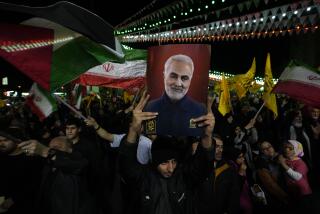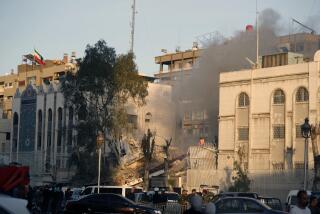Syria president’s denunciation exposes Mideast power struggle
Syrian President Bashar Assad’s condemnation of fellow Arab leaders exposes the power struggle running through a region where he, and his father before him, helped lead the cause of Arab nationalism.
In his first address to his country since June, a defiant Assad vowed to crush a 10-month-old popular revolt against him. But he also raged at what he regards as the Arab League’s betrayal of Damascus, singling out the Persian Gulf nations that have risen in stature as traditional powers Syria and Egypt have faded.
The dispute is tinged with the Middle East’s sectarian rivalries. Sunni Muslim-run, oil-rich gulf states and their patron, Saudi Arabia, are pitted against Shiite Muslim-controlled Iran and its allies, including Syria, whose longtime leaders belong to the Alawite sect, a Shiite offshoot. This tension has been sharpened over the last year.
Weakening Assad’s grip on Syria probably would strengthen the gulf states against Iran, which wields influence in Iraq and backs the militant groups Hezbollah in Lebanon and Hamas in the Gaza Strip. Sunni-run Bahrain has accused Iran of inciting sectarian animosity that has resulted in months of deadly government crackdowns on Shiite protesters.
Syria, once a font of Arab pride, is particularly upset by the diminutive, wealthy and media-savvy emirate of Qatar, whose moxie and influence extend well beyond its size. Qatar, which holds the rotating Arab League presidency, orchestrated Syria’s suspension from the 22-member group for violence against largely peaceful street protesters and has pushed for economic sanctions.
Those actions humiliated Syria, which helped found the group in 1945, decades before Qatar and other gulf states joined. Assad’s speech Tuesday was punctuated with barbs against other Arab countries, as if a long-simmering family squabble had erupted on a TV talk show.
“What Assad said about other Arab countries today puts an end to any patience or second chances Arab nations will give him,” said Nabil Abdel Fattah, an analyst at Al Ahram Center for Political and Strategic Studies in Cairo. “It’s an open game now and Arab countries wanting to see an end to Assad’s regime won’t be hiding it anymore.”
Assad, who has ruled Syria since his father, Hafez, died in 2000 after nearly three decades in power, did not mention Qatar by name. But he left little doubt of the contempt he held for gulf emirates that lacked Syria’s history and its past grandeur: “Countries can rent and import some history with their money, but money does not make nations and cultures.”
Yet part of the past that Assad was referencing is being swept away by rebellions that have shaken the Arab world for more than a year. He appeared, however, determined to defeat what he called a foreign conspiracy against him while vilifying Arab leaders he considered political opportunists facing yet another defining era in the region.
Qatar’s emir, Sheik Hamad bin Khalifa al Thani, and the country’s Al Jazeera TV network have shrewdly tapped into popular resentment against other autocratic governments that for generations epitomized the Arab world. Qatar and other gulf states, including the United Arab Emirates, a glittering financial hub, have been maneuvering for years to become influential international voices.
An absolute monarchy, Qatar has played negotiator to factions in conflicts in Lebanon and Yemen and among the Palestinians. Such forays over the years have helped shift regional diplomatic power toward the gulf, but they have also led to criticism that Qatar is attempting to play too many sides off one another, including by hosting a large U.S. military base.
There is also a degree of hypocrisy, as noted by Assad, folded into the ambitions of gulf states. Qatar’s allies Saudi Arabia and Bahrain have crushed peaceful protests against their own governments even as they criticize Assad’s security forces for the deaths of hundreds of demonstrators. Gulf autocrats have been conveniently selective in chastising fellow Arab leaders; Saudi Arabia stood behind toppled Egyptian President Hosni Mubarak until his last day in power.
“Their situation,” Assad said of gulf countries, “is like a doctor who smokes and recommends to his patient to quit cigarettes as he puts one in his mouth.”
The ill will between Damascus and the Arab League has been agitated by an observer mission the league sent to Syria last month to monitor the withdrawal of security forces from cities and neighborhoods sympathetic to opposition demonstrators. In recent days, a number of observers have been attacked and injured. League Secretary-General Nabil Elaraby said he held Damascus “totally responsible” for their safety.
Video posted by activists in the city of Latakia suggests that Assad supporters attacked an Arab League vehicle, the Associated Press reported.
“Unfortunately there have been attacks on monitors, especially those from [gulf] countries, attacks from non-opposition elements,” said UAE Foreign Minister Sheik Abdullah bin Zayed al Nahyan. “The task of the monitors is getting more difficult every day because we do not see a decline in … killings.”
Assad remains very much in power in the nation his family has run for four decades. He has shown little sign of ending his government’s crackdown or giving in to Arab League demands, including a peace plan agreed to on Dec. 19. The United Nations estimates that about 400 people have been killed since Arab League observers entered Syria, a stunning rebuke to the organization Damascus once held sway over.
The Arab League has often been criticized as a rubber stamp that gives despots cover. But the uprisings across the Arab world have spurred a change, albeit a limited one. The league supported North Atlantic Treaty Organization intervention against the late Moammar Kadafi in Libya, though it has been less aggressive in taking action against other Arab leaders.
With Assad, the league faces a formidable, entrenched autocrat who appears unlikely to accede to its demands any time soon.
Assad’s “blasting the league while the mission is still in Syria practically dooms any hopes of success the mission might have had,” said Abdel Fattah, the Cairo analyst. “Now the league is in a delicate predicament. I believe that Assad has speeded up the process of them resorting to the U.N.”
Amro Hassan of The Times’ Cairo bureau contributed to this report.
More to Read
Start your day right
Sign up for Essential California for news, features and recommendations from the L.A. Times and beyond in your inbox six days a week.
You may occasionally receive promotional content from the Los Angeles Times.







